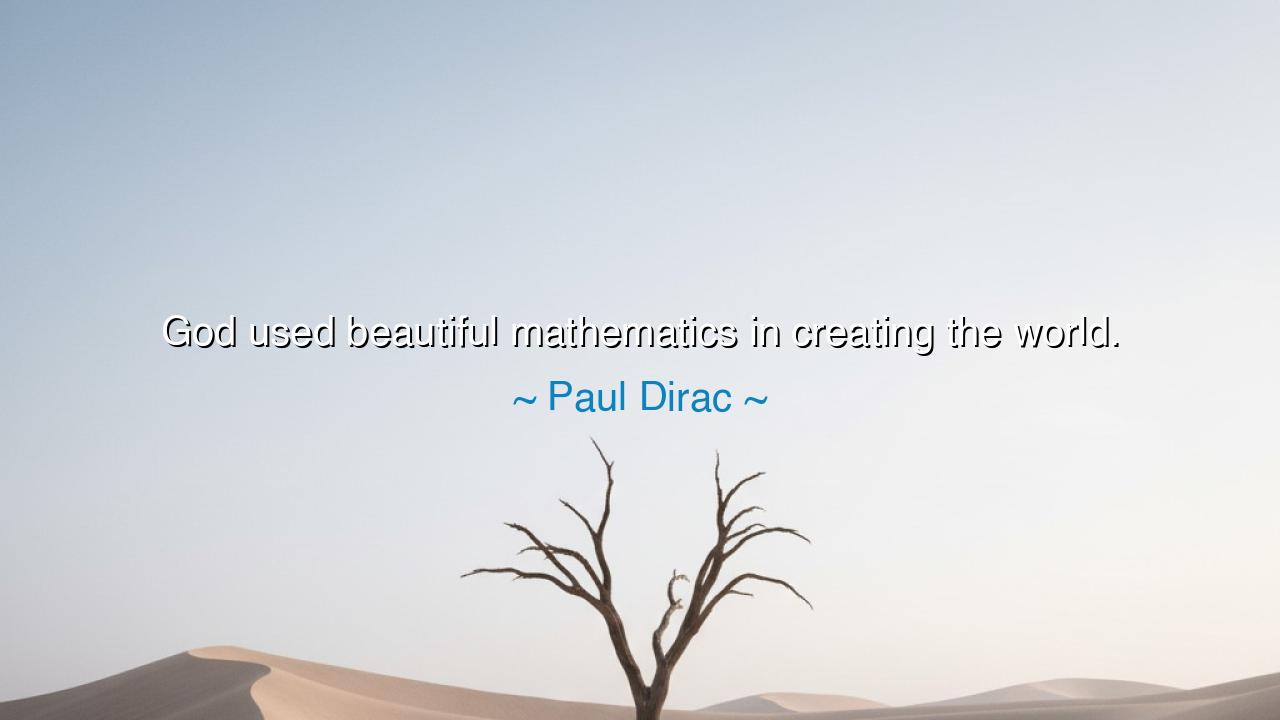
God used beautiful mathematics in creating the world.






"God used beautiful mathematics in creating the world." — These words by Paul Dirac, a towering figure in the field of theoretical physics, reflect a profound understanding that the Divine and science are not opposing forces, but rather two aspects of the same truth. Dirac, one of the architects of modern quantum theory, recognized that the mathematical structure that governs the universe is not only a tool for understanding the natural world but also a reflection of a higher, divine order. In this statement, Dirac acknowledges that the universe, with all its complexity, is crafted with elegance and harmony, governed by laws that can be expressed beautifully through the language of mathematics. This view harmonizes the ancient belief in a rational, ordered cosmos with the modern understanding of science — that God’s wisdom is embedded in the very structure of the universe.
The ancient philosophers, particularly the Pythagoreans, believed that the universe itself was mathematical in nature. For Pythagoras, the beauty of the cosmos could be understood through numbers, which governed everything from the harmony of the spheres to the proportions of physical objects. The Pythagoreans saw the universe as a grand symphony of mathematical relationships, where numbers were not mere abstractions but divine principles that revealed the mind of God. In this view, the Divine is not separate from the order of the cosmos but is deeply embedded in the very structure that holds the world together. Dirac’s quote reflects a modern echo of this ancient vision: that mathematics is not just a human invention, but a divine language that expresses the perfection of God’s creation.
The ancient Greeks were not the only ones to recognize the connection between mathematics and the Divine. In the Hebrew Scriptures, the wisdom literature speaks often of God as the Creator of an ordered universe. In the book of Proverbs, we read of Wisdom being with God at the creation of the world, laying the foundations of the earth with understanding and knowledge. The Psalms also declare, "The heavens declare the glory of God; the skies proclaim the work of His hands." In these texts, the order of the natural world is seen as a reflection of God’s wisdom and intelligence. To study the world, then, is to come closer to understanding God's mind — the mathematical order that underpins creation.
Dirac’s insight also resonates with the life and work of Albert Einstein, whose theory of relativity showed how the universe is shaped by mathematical laws. Einstein famously said, “The most incomprehensible thing about the universe is that it is comprehensible.” For Einstein, the fact that mathematics could describe the laws of nature was a testament to the intelligence behind the cosmos. Einstein, like Dirac, saw the hand of the Divine in the elegant structure of the universe. The universe, in its vast complexity and grace, could be understood through the language of math, which was no accident, but a design that pointed to a higher intelligence. This belief ties directly to the idea that mathematics is the means by which we can peer into the mind of God, uncovering the beauty and order He has woven into the fabric of the world.
In the ancient Christian tradition, St. Augustine spoke of the beauty and wisdom of God’s creation. He believed that the order and harmony of the universe were signs of God’s perfection. In his work, The City of God, he discussed how the material world is a reflection of the eternal truth that resides in God. Augustine, like Dirac, understood that the study of the natural world was not just a search for knowledge, but a way of coming closer to God. Mathematics, in this sense, was not simply a tool for scientists but a means of discovering the divine order that governs creation. The idea that God has woven beauty and truth into the fabric of reality through mathematical laws is a legacy that connects us back to the earliest reflections on the Divine and its expression in the world.
The lesson in Dirac’s words is clear: the beauty of the universe — its harmony, order, and structure — is a reflection of the Divine mind that created it. Mathematics is not merely a human endeavor; it is the language of the Divine, and by studying it, we draw closer to the truth and wisdom that God has embedded in all of creation. Just as the ancient philosophers sought to understand the world through numbers and proportions, we too are invited to see mathematics as a means of entering into the divine mystery. In every formula, in every equation, there is a glimpse of the Divine, a reminder that we are not separate from the cosmos, but part of a larger, harmonious whole.
In our own lives, let us approach science and mathematics not just as tools for material understanding, but as a means of spiritual discovery. Just as Einstein and Dirac saw the hand of God in the equations of the universe, so too can we. Let us study the world with the belief that behind every natural law lies the wisdom of the Creator, and that by seeking to understand these laws, we are participating in the divine work of creation. As we delve into the mysteries of the universe, let us be ever mindful that the beauty of mathematics is a reflection of the perfection and intelligence of God. And in doing so, we not only come to understand the world better but also draw closer to the heart of the Divine.






AAdministratorAdministrator
Welcome, honored guests. Please leave a comment, we will respond soon